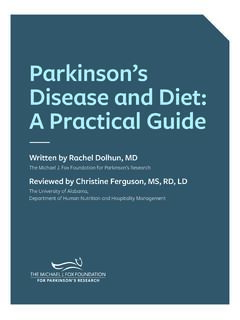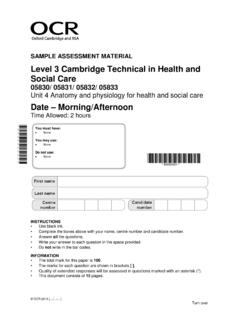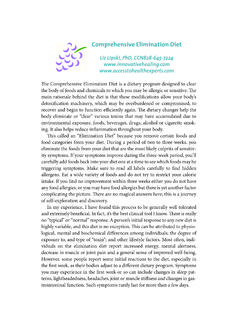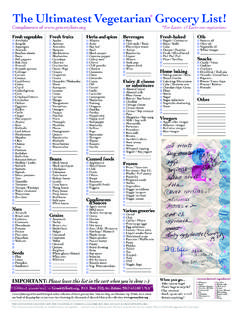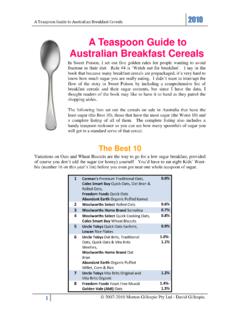Transcription of MICHAELJFOX
1 Michael J. Fox Foundation for Parkinson's Research | A Practical Guide on Parkinson s Disease and Diet2 Parkinson s and Diet: OverviewNo one specific diet is recommended for everyone with Parkinson s disease (PD). Still, what you eat may impact how well your medication works and can help some of the non-motor symptoms that are associated with PD. For general health and well-being, doctors encourage people with Parkinson s to follow a balanced diet, which includes whole grains, healthy fats (in foods like nuts, avocado and olive oil) and antioxidants.
2 Antioxidants are molecules that clear out free radicals substances that are potentially toxic to cells. Free radicals are formed in the body from normal metabolism, but are increased by exposure to environmental toxins, such as cigarette smoke and air pollution. Free radicals contribute to a condition called oxidative stress, which is associated with aging and Parkinson s disease. A diet high in antioxidants may therefore help to offset oxidative stress, although proof is lacking at this LIST FOR FOODS CONTAINING ANTIOXIDANTSV egetables: artichokes, okra, kale, bell peppers, potatoes Fruits: berries, pears, apples, grapes Legumes: kidney beans, edamame, lentils Nuts: pecans, walnuts, hazelnuts Dark chocolate Red wine (in moderation), coffee, teaThe Michael J.
3 Fox Foundation for Parkinson's Research | A Practical Guide on Parkinson s Disease and Diet3 Diet and Parkinson s Medications If you take certain Parkinson s medications, dietary adjust-ments may help the drugs work more effectively or avoid side effects. Carbidopa/levodopa contained in Sinemet, Sinemet CR, Stalevo, Parcopa and Rytary competes with protein for absorption in the intestine. Eating a meal that is high in protein, such as meat, fish or cheese, reduces how much levodopa is absorbed. If you find that medication isn t working optimally symptoms aren t fully controlled, for example you might consider saving higher amounts of protein for the evening and eating more vegetables and carbohydrates during the day.
4 Another way to improve levodopa absorption is to take it on an empty stomach 30 minutes before or 60 minutes after a meal. If this causes nausea, try combining it with a small carbohydrate snack like crackers, toast or agonists (pramipexole, ropinirole and rotigotine) do not require any dietetic adjustment. MAO-B inhibitors (rasagiline or selegiline) increase a substance called tyramine. When mixed with foods that contain high amounts of tyramine, the combination could raise blood pressure. Those who take these drugs should eat tyramine-containing items in moderation (but not necessarily eliminate them).
5 When on MAO-B inhibitors, be mindful of the following: Cured, fermented or air-dried meats: salami, mortadella Pickled fish: herring, lox Aged cheeses: Swiss, blue cheese, Camembert Fermented cabbage: sauerkraut, kimchi Soybean products: soy sauce, tofu, miso soup Alcoholic beverages: vermouth, tap beer, wineParkinson s and ConstipationConstipation is, unfortunately, common among people with Parkinson s disease. Not only is this non-motor symptom uncomfortable, it can interfere with medication absorption and effectiveness. Dietary and behavioral changes can help, but if these aren t enough, stool softeners, laxatives and/or prescription medications may be necessary.
6 Over-the-counter therapies should should always be discussed with your doctor to ensure they are safe and don t interact with prescribed medications. You should also ask your physician whether other prescription drugs could be contributing to constipa-tion. Anticholinergic medications, like trihexyphenidyl (Artane), and opiate pain medications are common suggestions to ease constipation: Exercise regularly. Gradually add more fiber to your diet. Eat foods containing probiotics. Increase water intake. Drink warm liquid in the morning to stimulate bowel LIST FOR MANAGING CONSTIPATIONHigh-fiber foods: bran, whole grains, beans, peas, berries Probiotics: yogurt, kefir, miso soup, sauerkraut, pickles Fresh fruits: pears, plums, apples Dried fruits: prunes, figs, dates, apricots, raisinsThe Michael J.
7 Fox Foundation for Parkinson's Research | A Practical Guide on Parkinson s Disease and Diet4 Parkinson s and Low Blood PressureLow blood pressure can be due to Parkinson s and/or the medications used to address it. Decreased blood pressure can lead to dizziness and lightheadedness, so it s important to recognize and treat it. Lifestyle and dietary shifts, such as raising fluid and salt consumption, can help. Before making any changes, though, talk with your doctor, especially if you have heart or kidney problems. And while you re discussing the issue, make sure none of your prescription medications are playing a role diuretics (fluid pills), bladder medications and some antidepressants can lower blood pressure.
8 Strategies to prevent low blood pressure: Increase water intake to approximately six to eight 8-ounce glasses per day. If your heart and kidneys are healthy, add salt to your diet with V8 juice, Gatorade and canned soups. Avoid hot, caffeinated or alcoholic beverages as these can worsen low blood pressure. Eat multiple small meals throughout the day rather than three big ones. Participate in regular exercise, but avoid excessive sweating. Parkinson s and Diet: Frequently Asked QuestionsCan coconut oil treat Parkinson s disease? Some people believe that coconut oil might be helpful for memory problems and specifically for those that are associat-ed with Parkinson s disease.
9 At the current time, there is no validated scientific research to support these claims. I ve heard fava beans contain levodopa. Should I eat them?Fava beans do contain levodopa, so adding them to your diet might be an attractive idea. Unfortunately the concentration and availability of levodopa in fava beans are variable so the response is inconsistent. Eating fava beans when you are taking prescribed levodopa (as in Sinemet or Rytary, for example) could potentially result in too much levodopa, which could lead to dyskinesia (abnormal involuntary movements).
10 Consuming fava beans if you are not on levodopa may or may not have any noticeable or beneficial effect. Are any dietary supplements recommended for treating Parkinson s disease?No specific dietary supplements are recommended for treating Parkinson s disease, although many antioxidant supplements CoQ10, vitamin E, creatine, inosine and glutathione have been or are currently being studied. Separate large Phase III studies of creatine and of CoQ10 plus vitamin E failed to show benefit. Additionally, inosine, the precursor to the antioxidant urate, will enter Phase III testing in 2016.
